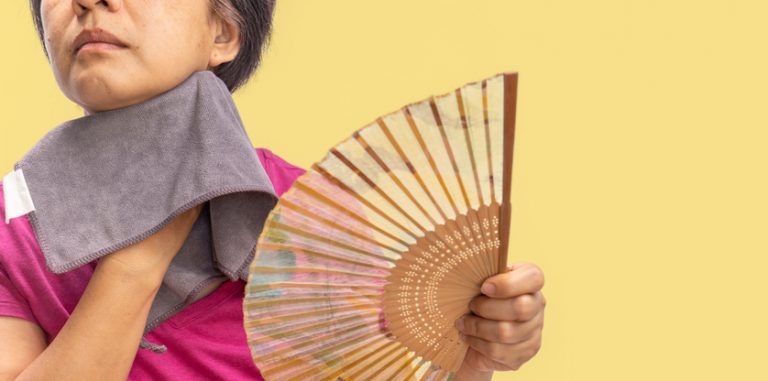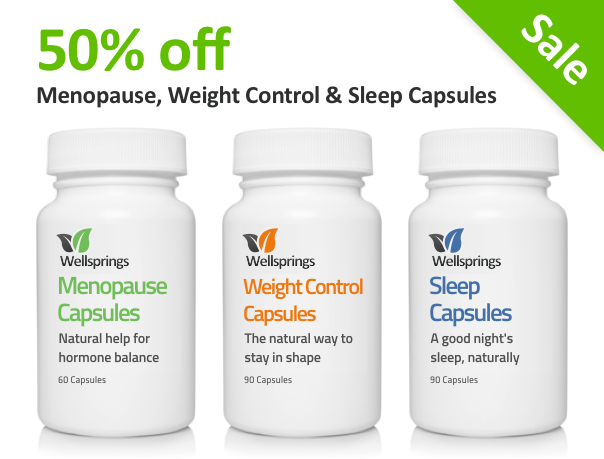13 Reasons Why Hot Flushes Are Not The Only Cause Of Your Sweats
Do you know how many things can cause you to heat up and flush, and its not just menopause?

It is a very lucky woman who does not suffer at least a few hot flushes at menopause. There are several reasons for this one being that plunging oestrogen levels play tricks on the hypothalamus — the body’s temperature gauge.
No matter how frigid it is outside, a hot flush will make your body think you’re in the middle of a heat wave.
In a desperate attempt to shed excess heat, the blood vessels in your skin widen and your sweat glands go into overdrive, leaving you feeling flushed, sweaty, and yearning for a cold shower.
These are some of the other factors that can bring on a flush.
1. Heat and humidity
When the temperature rises, your sweat glands (some 2 to 4 million of them) spring into action, making perspiration. Sweating is your body’s natural way of keeping you cool.
Some sweat evaporates from your skin, taking heat with it. The rest runs down your face and body. You feel hotter when it’s humid because the wetter air leaves less room for the sweat to evaporate off your body.
2. The anger factor
When you’re angry and reaching your boiling point, your body releases stress hormones that boost your heart rate and blood pressure and raise your body temperature, which can lead to sweating.
Anger is a healthy emotion once in a while, but regularly losing your temper could signal a problem.
3. Exercise
Breaking a sweat is one way to tell that you’re getting a good workout. Because you lose fluid when you sweat — especially when it’s hot — you need to stay hydrated.
Remember to drink water before you exercise, during your activity, and after you’re done. This will help your body temperature and performance, too.
4. Being stressed and anxious
Anyone who’s missed a big work deadline or frozen in a difficult situation knows how stress, anxiety, and embarrassment can make you sweat.
Emotional stress targets the sweat glands in the palms of your hands and soles of your feet, which is why it can be uncomfortable to shake hands when you’re nervous.
5. Running a temperature
When you’re sick, your brain raises your body’s thermostat a few degrees. You’ll feel cold and have chills as your body tries to make a less welcoming place for germs.
After your fever breaks and your thermostat resets itself to normal, you’ll feel hot and start to sweat. The sweat helps to cool you off to around 98.6 degrees again.
6. Illness or infection
You don’t have to have a fever. Sweating can also be a symptom of heart-related chest pain, called angina, and a heart attack.
Infections, diabetes, and an overactive thyroid gland can also open the floodgates. Some diseases, like cancer, tuberculosis and HIV, may cause night sweats.
If you’re sweating a lot and concerned about it, see your doctor.
7. Coffee
That morning cup can do more than wake you up as coffee triggers perspiration in two ways.
First, caffeine activates the central nervous system, turning on sweat glands (the more caffeine you drink, the more you sweat).
Second, the heat from the drink itself can make your body feel hot enough to sweat.
8. Spicy foods
When you bite into a spicy Indian or Thai curry, it fools your body into thinking it’s hot by setting off the same nerve receptors that respond to heat.
That’s why eating those foods, or even a bowl of spicy soup, can make your tongue sizzle and your face bead up with sweat.
9. Too much alcohol
You can tell right away when someone’s been throwing back a few too many drinks. They are wobbly on their feet, slur their speech, and their face is flushed and sweaty.
The sweatiness is due to an effect called vasodilation — widening of the blood vessels in the skin.
10. Smoking
Here’s another reason to stamp out that cigarette: nicotine tells your body to release the chemical acetylcholine, which turns on the sweat glands. It also raises your heart rate, blood pressure, and body temperature.
Nicotine withdrawal also causes excess perspiration, but if you can sweat it out long enough to kick the habit, you’ll lower your odds of getting cancer, emphysema, and dozens of other diseases.
11. Medication side effects
Though they’re meant to make us feel better, some medicines can cause their own symptoms.
Sweating may be a side effect of many drugs, including antidepressants, nonsteroidal anti-inflammatory drugs (NSAIDs), blood pressure medications, cancer treatments, and some diabetes medicines.
If your medication is making you too sweaty, talk to your doctor about changing your dose or switching to another drug.
12. Love
You might think it’s your heart that starts this amazing process but falling in love actually starts in your brain, with a rush of adrenaline-like “love chemicals.”
These are responsible for the racing heart, sweaty palms, and other telltale physical signs that you’re smitten.
13. Hormone imbalance
Hormones surging through your body and a faster metabolic rate can make you hotter than usual and make your sweat glands more active.
This is true of both pregnancy and the menopause alike, so be sure to drink enough water to keep you hydrated and check your hormone balance for conditions such as oestrogen dominance.
Helpful information:
The majority of hot flushes will respond to progesterone alone, particularly if you are oestrogen dominant.
If that is not sufficient then adding in the herbal Menopause Capsules from Wellsprings can make all the difference and maximise the benefit of the cream.
However, if they are particularly severe – including night sweats – then you are best with a combination of both progesterone and oestrogen.
https://anna.blog.wellsprings-health.com/night-sweats-and-what-to-do-about-them/

















